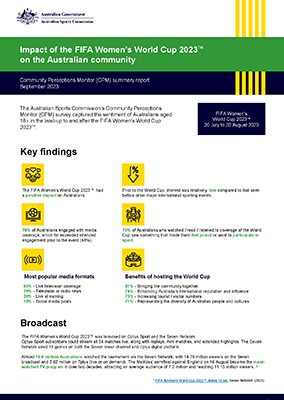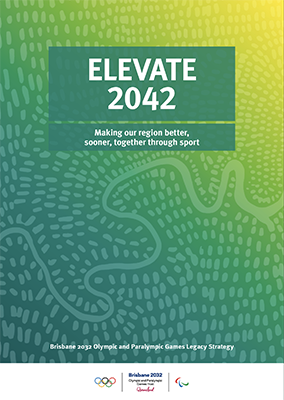EVIDENCE BASE FOR SPORT
MAJOR SPORTING EVENT IMPACT AND LEGACY
QUICKFACTS
A major sporting event is one that generates significant interest, has a high profile, or attracts visitors to Australia.6
Funding 1
91% of Australians feel that use of government/public funding to support hosting major sporting events is worthwhile.
Exposure 2
Hosting major sporting events often raises the profile of the host city/country and has flow on benefits for the economy. Between 2012 and 2016 London hosted over 30 large-scale sporting events delivering an estimated £1.023 billion to the city’s economy.
Hosting 3
More than 16 major sporting events will be hosted by Australia from 2022-2032 including:
- World Cups
- World Championships
- the Olympic and Paralympic Games
Benefits 1
Important benefits Australians think events can, or should, have include:
- Increased employment opportunities
- new infrastructure and facilities
- an increase in tourists and visitors
- people being inspired to improve their own physical health and wellbeing.
Economic value 4
The 2015 Cricket World Cup in Australia and New Zealand generated more than AU$1.1 billion in direct spending and created the equivalent of 8,320 full-time jobs.
Reputation 5
Australia's ability to host successful major events – including the Sydney 2000 Olympic and Paralympic Games and the Gold Coast 2018 Commonwealth Games – projects a positive image of the country and can be seen as signaling competence.
References +
- Community Perceptions Monitor: Major events, Australian Sports Commission, (5 July 2022).
- London four years on: a global host for sport, London & Partners, (July 2016).
- Upcoming major sporting events in Australia, Australian Government, Office for Sport, (accessed 5 July 2022).
- Cricket World Cup 2015 Ltd: economic impact and benefit analysis of the ICC Cricket World Cup 2015, PricewaterhouseCoopers, Final Report, (2015).
- Major sporting event impact and legacy, Clearinghouse for Sport, (accessed 25 November 2022)
- Major sporting events, Australian Government, Office for Sport, (accessed 16 November 2022)
TOPICS
Discover more about major sporting event impacts and legacies.
FEATURED REPORTS
Impact of the FIFA Women’s World Cup 2023 on the Australian community
Community Perceptions Monitor, (2023)
Read the report

WHAT WE KNOW
EVIDENCE BASE FOR SPORT
Find information, research, and insights to support decision making in sport.WHAT WE NEED TO KNOW
NATIONAL SPORT RESEARCH AGENDA
Identifying priority areas of research for Australian sport.EXPLORE
Explore our extensive range of information resources relating to sport.

PUBLICATIONS
Search and access research and data from journals, databases, books, reports, surveys, and more.

RESEARCH DATA
Research data from the Australian Sports Commission's national sport and physical activity survey – AusPlay.

